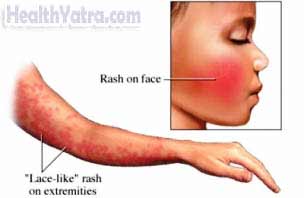Definition
Fifth disease is a viral infection common in children. The infection results in a mild rash on the face, trunk, and limbs. In healthy people, fifth disease usually goes away without medical treatment. Pregnant women, people with immune system problems,sickle cell anemia, or other blood disorders may be more effected. They may need to see a doctor.

Causes
Fifth disease is caused by a virus called parvovirus B19. About half of all adults have been infected with this virus at some time.
The parvovirus is found in saliva, sputum coughed up from the lungs, and nasal mucus. It is usually spread from person-to-person through contact with those fluids.
Risk Factors
The following factors increase your chance of developing fifth disease:
- Age: fifth disease occurs most often in children
- Contact with someone infected with parvovirus B19
There is a parvovirus that can cause infections in cats and dogs. This is not the same virus that can make humans ill. Contact with an animal with a parvovirus will not make you ill.
Symptoms
If you have any of these symptoms, do not assume it is due to fifth disease. These symptoms may be caused by other conditions.
The first signs of fifth disease usually occur within 4 to 14 days after becoming infected. These symptoms may include:
- Low-grade fever
- Headache
- Stuffy or runny nose
A bright red rash on the face will begin to show a few days after these first signs. The rash is known as slapped cheek rash. Several days later, this rash spreads down the trunk and limbs. The rash usually goes away within 7 to 10 days.
In some adults, there may be no symptoms or rash. Adults are more likely to have joint pain and swelling with this infection.
Diagnosis
Your doctor will ask about your symptoms and medical history. A physical exam will be done.
Tests may include the following:
- Examination of the rash
- Blood test to identify antibodies to parvovirus
Treatment
Talk with your doctor about the best treatment plan for you. Usually, fifth disease does not require any treatment other than rest.
Treatment options include the following:
Medications
Antiviral medications can prevent or weaken infections caused by specific viruses. Right now, there are no antiviral medications for fifth disease.
Some medications may help relieve some symptoms:
- Acetaminophen or ibuprofen may help reduce joint pain or fever.
- Anti-itch medications may be used to relieve itching caused by the rash.
People With Chronic Anemia
Fifth disease can cause more severe symptoms if you have sickle cell disease or other types of chronic anemia. You may develop a severe anemia. This is dangerously low level of red blood cells. The anemia will require treatment. It may include hospitalization and blood transfusions.
People With Immune Problems
Weakened immune systems can lead to a more severe infection. If you have immune problems your doctor may recommend special medical care. This may include preventive treatment with antibodies.
Women Who Are Pregnant
This type of infection can cause problems in about 5% of pregnant women. Although the complications are rare they can be severe. A parvovirus B19 infection during pregnancy may cause a miscarriage or severe anemia in the baby. If you are pregnant and believe that you may have this infection or have been exposed to someone with the infection, see your doctor.
Prevention
It is difficult to prevent the spread of fifth disease. The virus is most easily passed on before the rash appears. People may not know they are infected.
To help reduce your chances of getting any virus:
- Practice good hygiene.
- Wash your hands often.
- Try to avoid touching your eyes, mouth, and nose.
- Avoid close contact with people who are infected. Wash your hands after coming in contact with someone who has a virus.
